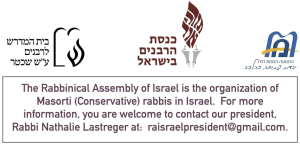
![]()
“Listen! Your brother’s blood cries out to me from the soil.” The Hebrew word understood as “your brother” can be read (without its vowels) not in the singular, but in the plural: “Your brothers’ blood…,” the blood of our own brothers and sisters, fathers and mothers. The cries of widows and the tears of orphans have split the air for more than a year, and an entire segment of society shuts it ears, turns away from the mitzvah “Do not stand idly by your fellow person’s blood,” asking instead, “Am I my brother’s (or: brothers’) keeper?”
The Rabbis warned us against the slippery slope, saying “Love work and hate lordship,” “Do not make them [i.e., words of Torah] a crown to elevate yourself, nor a spade to dig with.” To my mind, the central characteristic toward which the Torah tries to direct us is “responsibility.” The Hebrew term, aḥrāyut is related to aḥer, “other.” A responsible person is someone who sees the other and looks after him. Our term, “responsibility,” is related to the verb “respond,” meaning to react, to relate. But it can also be termed “accountability,” from the word “account”—in the sense of doing the arithmetic, keeping a record. Jewish responsibility, or accountability, is offering a full accounting of our deeds both toward God and toward the society around us. May we live up to the adage kol Yisrael ‘arevim zeh ba-zeh, “all Israel is responsible, one for the other.”
![]()
